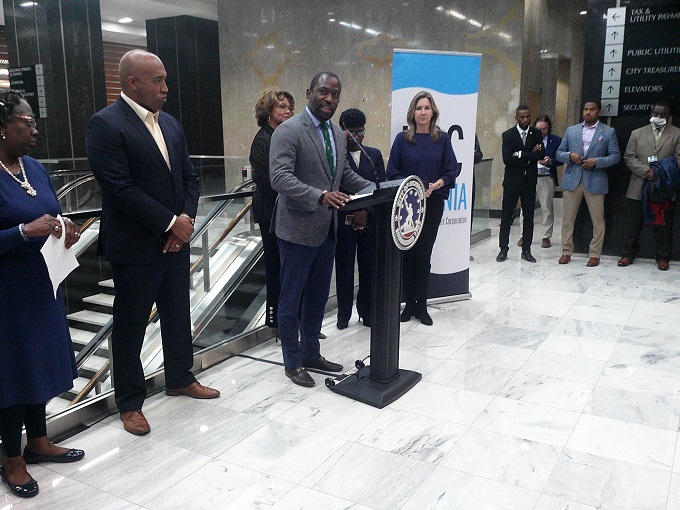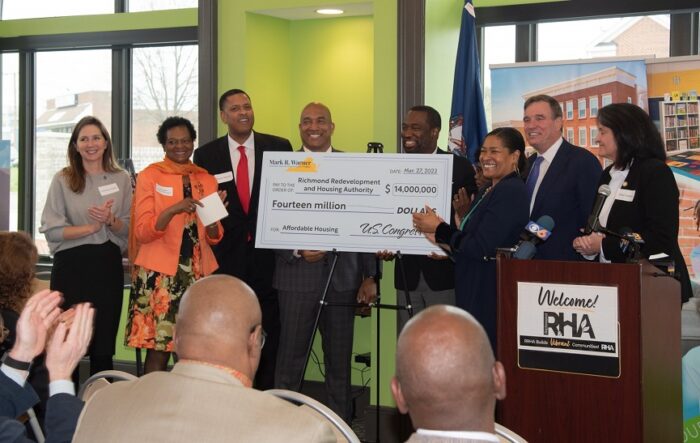
Mayor Levar Stoney announced the funding match in a press conference Tuesday with, pictured from left, LISC President Denise Scott and City Councilmembers Michael Jones, Ellen Robertson, Cynthia Newbille and Katherine Jordan. (Jonathan Spiers photo)
Richmond’s efforts to increase housing availability in the city is getting a funding boost from a national nonprofit.
City leaders announced Tuesday that Local Initiatives Support Corp. (LISC) has committed to matching Richmond’s investment of $50 million over the next five years to support income-based housing projects in the city. The match means a total investment of $100 million over the five years between the city and LISC.
Denise Scott, president of the New York-based nonprofit that has a Virginia office in Richmond, said LISC was motivated to provide the funding match after learning of the city’s recent designation of $10 million each year in the city’s five-year Capital Improvement Plan for projects to support lower-income housing.
“The complex challenges of addressing the affordability housing crisis really requires bold actions, innovative approaches and strategic initiatives, and clearly Richmond has created significant new investment opportunities,” Scott said in a press conference at City Hall.
“With these investments, we will be able to really accelerate the volume and the velocity of affordable housing development in the city,” she said. “Our collective impact will result in thousands of units and hundreds of millions of dollars in investment. To be clear, $100 million is the investment; it leverages significantly more.”
Tuesday’s announcement came seven months after Mayor Levar Stoney and members of City Council declared a housing crisis in Richmond, in an effort to drum up more action from stakeholders and support from state government and private and nonprofit developers. Stoney said Tuesday that LISC fits the bill.
“Affordable housing is one of LISC’s areas of expertise. Housing is where LISC got started,” Stoney said. “It remains a cornerstone of their mission, and they work hard to make quality affordable housing available for low-income residents.”
Stoney said LISC will work with lenders and philanthropic organizations to generate the funding, which likewise will be allocated at $10 million per year.
The funds will be used to establish a new small building loan program for developers and rental property owners to rehab or construct buildings with five to 49 units, as well as a developer training program – called the Housing Development Training Institute – that LISC has introduced in other cities across the country.
“Stay tuned for that,” Scott said, describing the program as focused on helping to grow talent in the Richmond market “so that more small businesses, small developers can benefit from this big investment.”
Other support from LISC would come in areas such as low-income housing tax credits, small building preservation funding, and homeownership preservation including home repair programs and training, Scott said. The nonprofit would also work with other groups in the region, including the Richmond Redevelopment & Housing Authority, which launched its own homeownership initiative this summer.
With a presence in the region over three decades, Scott said LISC has invested about $165 million over 33 years that she said has leveraged nearly $800 million in total investment and supported about 7,000 units of housing. Scott was joined by administrators with LISC Virginia, including Executive Director Jane Ferrara, a former economic development official for Richmond who joined LISC in 2020.
Earlier this year, Stoney announced a goal of creating 2,000 new homeownership opportunities for low-income Richmonders by 2030, with the city committing an initial $2 million investment to the cause. That’s in addition to a previously stated goal of adding 1,000 new lower-income housing units per year.
Efforts aimed at achieving those goals have included the release of $10 million in American Rescue Plan Act funds into the city’s Affordable Housing Trust Fund, which Stoney has said resulted in over 1,000 new rental units for lower-income households. Stoney said Tuesday that 9,000 residential units have been added in the city since 2019.
In March, the day before Richmond’s housing crisis declaration, U.S. Sen. Mark Warner awarded $14 million from the U.S. Department of Housing and Urban Development to assist the city’s housing efforts.

U.S. Sen. Mark Warner, second from right, presented the check to city leaders in March. (File photo courtesy Mark Warner’s office)
Those efforts have included putting $1.4 million in ARPA funds for a first-time homebuyer’s assistance program for city employees wanting to reside in Richmond, and $500,000 to support revolving loan programs for alternative homeownership opportunities, including manufactured homes.
Stoney said Tuesday that Richmond has a housing shortage of about 40,000 units, contributing to a low housing supply that he said is driving up rents in the city. He credited Councilmember Ellen Robertson for leading the city’s efforts to address the issue, including the collaboration with LISC.
Robertson, who was joined by fellow councilmembers Michael Jones, Katherine Jordan and Cynthia Newbille, described LISC as a proven resource for the region.
“They have been a partner in this city and they have a history of knowing exactly what you need, knowing exactly how to provide it and also delivering everything that they promise,” Robertson said. “This is a tremendous partnership that’s not a case study; it’s been done before. They know their stuff and they know it well, and they bring a lot more resources.”
LISC Virginia is one of over 35 local offices for the community development nonprofit. Its other efforts in Central Virginia include Wells Fargo’s WORTH (Wealth Opportunity Restored Through Homeownership) Initiative, a $7.5 million investment by Wells Fargo Foundation to expand homeownership for families of color with a goal of creating 5,000 new homeowners by 2025.

Mayor Levar Stoney announced the funding match in a press conference Tuesday with, pictured from left, LISC President Denise Scott and City Councilmembers Michael Jones, Ellen Robertson, Cynthia Newbille and Katherine Jordan. (Jonathan Spiers photo)
Richmond’s efforts to increase housing availability in the city is getting a funding boost from a national nonprofit.
City leaders announced Tuesday that Local Initiatives Support Corp. (LISC) has committed to matching Richmond’s investment of $50 million over the next five years to support income-based housing projects in the city. The match means a total investment of $100 million over the five years between the city and LISC.
Denise Scott, president of the New York-based nonprofit that has a Virginia office in Richmond, said LISC was motivated to provide the funding match after learning of the city’s recent designation of $10 million each year in the city’s five-year Capital Improvement Plan for projects to support lower-income housing.
“The complex challenges of addressing the affordability housing crisis really requires bold actions, innovative approaches and strategic initiatives, and clearly Richmond has created significant new investment opportunities,” Scott said in a press conference at City Hall.
“With these investments, we will be able to really accelerate the volume and the velocity of affordable housing development in the city,” she said. “Our collective impact will result in thousands of units and hundreds of millions of dollars in investment. To be clear, $100 million is the investment; it leverages significantly more.”
Tuesday’s announcement came seven months after Mayor Levar Stoney and members of City Council declared a housing crisis in Richmond, in an effort to drum up more action from stakeholders and support from state government and private and nonprofit developers. Stoney said Tuesday that LISC fits the bill.
“Affordable housing is one of LISC’s areas of expertise. Housing is where LISC got started,” Stoney said. “It remains a cornerstone of their mission, and they work hard to make quality affordable housing available for low-income residents.”
Stoney said LISC will work with lenders and philanthropic organizations to generate the funding, which likewise will be allocated at $10 million per year.
The funds will be used to establish a new small building loan program for developers and rental property owners to rehab or construct buildings with five to 49 units, as well as a developer training program – called the Housing Development Training Institute – that LISC has introduced in other cities across the country.
“Stay tuned for that,” Scott said, describing the program as focused on helping to grow talent in the Richmond market “so that more small businesses, small developers can benefit from this big investment.”
Other support from LISC would come in areas such as low-income housing tax credits, small building preservation funding, and homeownership preservation including home repair programs and training, Scott said. The nonprofit would also work with other groups in the region, including the Richmond Redevelopment & Housing Authority, which launched its own homeownership initiative this summer.
With a presence in the region over three decades, Scott said LISC has invested about $165 million over 33 years that she said has leveraged nearly $800 million in total investment and supported about 7,000 units of housing. Scott was joined by administrators with LISC Virginia, including Executive Director Jane Ferrara, a former economic development official for Richmond who joined LISC in 2020.
Earlier this year, Stoney announced a goal of creating 2,000 new homeownership opportunities for low-income Richmonders by 2030, with the city committing an initial $2 million investment to the cause. That’s in addition to a previously stated goal of adding 1,000 new lower-income housing units per year.
Efforts aimed at achieving those goals have included the release of $10 million in American Rescue Plan Act funds into the city’s Affordable Housing Trust Fund, which Stoney has said resulted in over 1,000 new rental units for lower-income households. Stoney said Tuesday that 9,000 residential units have been added in the city since 2019.
In March, the day before Richmond’s housing crisis declaration, U.S. Sen. Mark Warner awarded $14 million from the U.S. Department of Housing and Urban Development to assist the city’s housing efforts.

U.S. Sen. Mark Warner, second from right, presented the check to city leaders in March. (File photo courtesy Mark Warner’s office)
Those efforts have included putting $1.4 million in ARPA funds for a first-time homebuyer’s assistance program for city employees wanting to reside in Richmond, and $500,000 to support revolving loan programs for alternative homeownership opportunities, including manufactured homes.
Stoney said Tuesday that Richmond has a housing shortage of about 40,000 units, contributing to a low housing supply that he said is driving up rents in the city. He credited Councilmember Ellen Robertson for leading the city’s efforts to address the issue, including the collaboration with LISC.
Robertson, who was joined by fellow councilmembers Michael Jones, Katherine Jordan and Cynthia Newbille, described LISC as a proven resource for the region.
“They have been a partner in this city and they have a history of knowing exactly what you need, knowing exactly how to provide it and also delivering everything that they promise,” Robertson said. “This is a tremendous partnership that’s not a case study; it’s been done before. They know their stuff and they know it well, and they bring a lot more resources.”
LISC Virginia is one of over 35 local offices for the community development nonprofit. Its other efforts in Central Virginia include Wells Fargo’s WORTH (Wealth Opportunity Restored Through Homeownership) Initiative, a $7.5 million investment by Wells Fargo Foundation to expand homeownership for families of color with a goal of creating 5,000 new homeowners by 2025.




Well, there’s a housing crisis in much of North America.
I always say that if you can get free money, take it. Matching programs are a great example of this.
Another false flag operation by the Mayor to build his credentials. Read the DETAILS. 1) $10 million per year from the City will have to allocated each year and that is not much more than the $8M CDBG entitlement they get from HUD yearly the benefits maybe 50-100 households each year. 2) “LISC will work with lenders and philanthropic organizations to generate the funding, which likewise will be allocated at $10 million per year” so that means they will apply to organizations to try and win monies. No guarantee. If they city currently spends $4.6M in CDBG funds and $1.7M… Read more »
Technically 10 million a year could pay the rent for 600 people at $1,500 dollars a month.
Carl work in federal grants….20% off the top goes for project admin and soft costs. Through in profit for the developers and the actual direct funds into the project go down to under 75% (in my experience it ends at 66% of the announcement dollars). So that would be 400 families (people). And that money help less and less each year with inflation. Again it is helpful but not going to make a dent when we are talking being 10,000 units or more short.
where is LISC getting the money? Does LISC actually have the money?